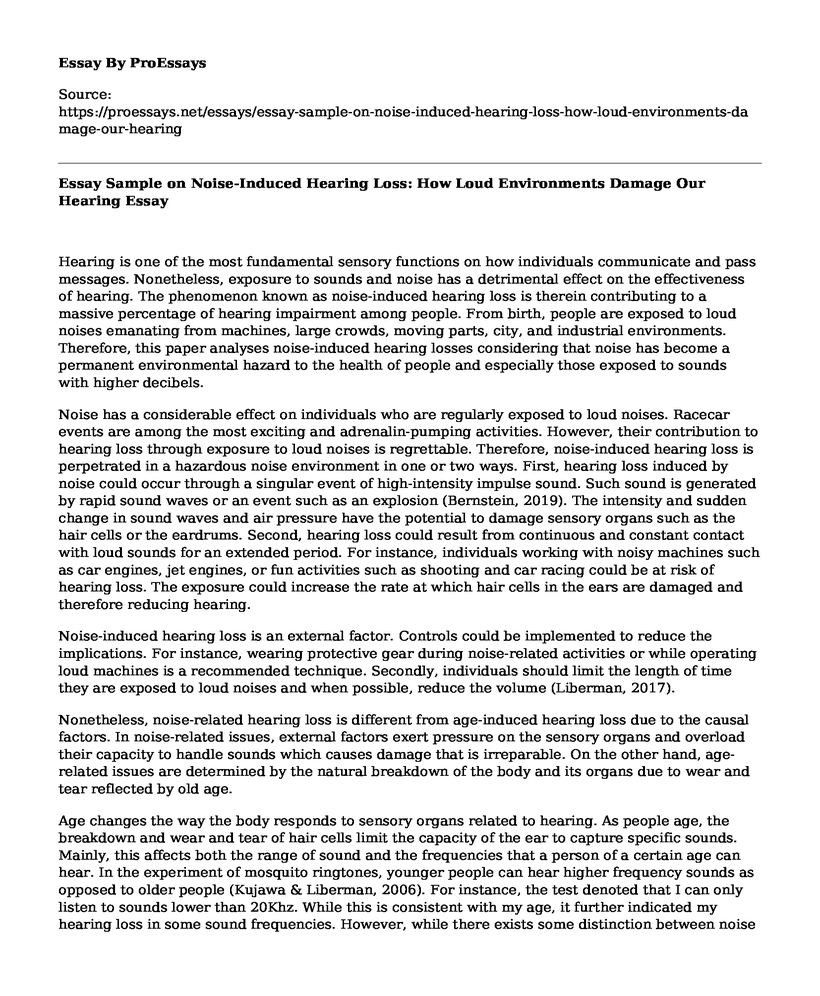Hearing is one of the most fundamental sensory functions on how individuals communicate and pass messages. Nonetheless, exposure to sounds and noise has a detrimental effect on the effectiveness of hearing. The phenomenon known as noise-induced hearing loss is therein contributing to a massive percentage of hearing impairment among people. From birth, people are exposed to loud noises emanating from machines, large crowds, moving parts, city, and industrial environments. Therefore, this paper analyses noise-induced hearing losses considering that noise has become a permanent environmental hazard to the health of people and especially those exposed to sounds with higher decibels.
Noise has a considerable effect on individuals who are regularly exposed to loud noises. Racecar events are among the most exciting and adrenalin-pumping activities. However, their contribution to hearing loss through exposure to loud noises is regrettable. Therefore, noise-induced hearing loss is perpetrated in a hazardous noise environment in one or two ways. First, hearing loss induced by noise could occur through a singular event of high-intensity impulse sound. Such sound is generated by rapid sound waves or an event such as an explosion (Bernstein, 2019). The intensity and sudden change in sound waves and air pressure have the potential to damage sensory organs such as the hair cells or the eardrums. Second, hearing loss could result from continuous and constant contact with loud sounds for an extended period. For instance, individuals working with noisy machines such as car engines, jet engines, or fun activities such as shooting and car racing could be at risk of hearing loss. The exposure could increase the rate at which hair cells in the ears are damaged and therefore reducing hearing.
Noise-induced hearing loss is an external factor. Controls could be implemented to reduce the implications. For instance, wearing protective gear during noise-related activities or while operating loud machines is a recommended technique. Secondly, individuals should limit the length of time they are exposed to loud noises and when possible, reduce the volume (Liberman, 2017).
Nonetheless, noise-related hearing loss is different from age-induced hearing loss due to the causal factors. In noise-related issues, external factors exert pressure on the sensory organs and overload their capacity to handle sounds which causes damage that is irreparable. On the other hand, age-related issues are determined by the natural breakdown of the body and its organs due to wear and tear reflected by old age.
Age changes the way the body responds to sensory organs related to hearing. As people age, the breakdown and wear and tear of hair cells limit the capacity of the ear to capture specific sounds. Mainly, this affects both the range of sound and the frequencies that a person of a certain age can hear. In the experiment of mosquito ringtones, younger people can hear higher frequency sounds as opposed to older people (Kujawa & Liberman, 2006). For instance, the test denoted that I can only listen to sounds lower than 20Khz. While this is consistent with my age, it further indicated my hearing loss in some sound frequencies. However, while there exists some distinction between noise and age-related hearing loss, significant exposure to noise can help to distinguish between the two. For instance, the natural wear and tear in sensory organs attributed to old age results from long-time exposure to loud sounds.
Conclusion
In summation, noise-related hearing loss is a common phenomenon to all individuals due to the environmental factors beyond the people's control. Exposure to noise frequently is a warranted risk on one's hearing capabilities. People exposed to loud places are often at risk of hearing losses. Some of the loud noises include machine noises and extremely loud music. Therefore, limiting exposure to loud sounds may limit the risk of sudden noise-induced hearing loss, but does not eliminate the threat.
References
Bernstein, V. (2019). The Sound and the Fury, and Possibly the Danger. Retrieved from https://www.nytimes.com/2007/08/26/sports/othersports/26noise.html?_r=2
Kujawa, S. G., & Liberman, M. C. (2006). Acceleration of age-related hearing loss by early noise exposure: Evidence of a misspent youth. Journal of Neuroscience, 26(7), 2115-2123. doi: 10.1523/JNEUROSCI.4985-05.2006
Liberman, M. (2017). Noise-induced and age-related hearing loss: new perspectives and potential therapies. F1000research, 6, 927. doi: 10.12688/f1000research.11310.1
Cite this page
Essay Sample on Noise-Induced Hearing Loss: How Loud Environments Damage Our Hearing. (2023, Feb 09). Retrieved from https://proessays.net/essays/essay-sample-on-noise-induced-hearing-loss-how-loud-environments-damage-our-hearing
If you are the original author of this essay and no longer wish to have it published on the ProEssays website, please click below to request its removal:
- Healthy College Living - Essay Example on Public Health
- Paper Example on Form of Allergies
- Critical Incident in Social Work Essay Example
- Women's Access to Abortion Services - Essay Sample
- Essay Sample on Cerebrovascular & Coronary Artery Disease: Causes & Effects
- Allergic Fungal Rhinosinusitis: Recent Findings on Immunotherapy - Essay Sample
- Healthcare for Undocumented Immigrants- Report Sample







